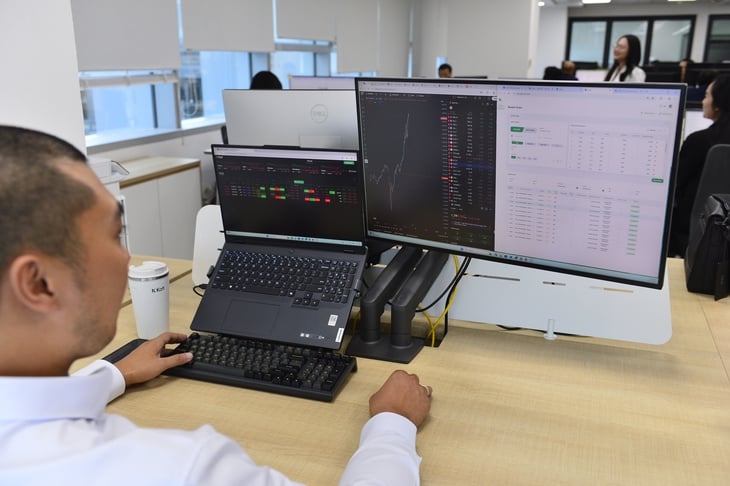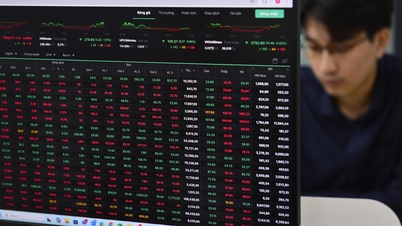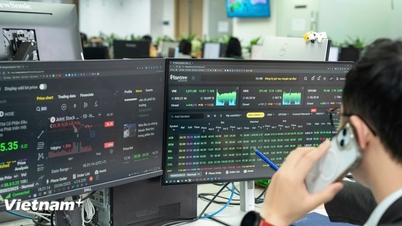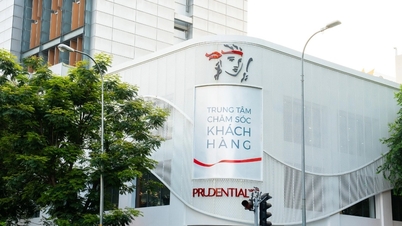
VN-Index is forecast to increase beyond 1,800 by the end of this year - Photo: QUANG DINH
How will stocks be affected by trade tensions?
At the end of last week's session, VN-Index closed at 1747.55, up more than 31 points and climbing to a new all-time high.
However, Mr. Bui Van Huy, Research Director and Vice President of FIDT, noted that the market is facing certain risks as US stocks fell sharply over the weekend after US-China tensions showed signs of heating up again.
This time, Vietnam is not the target like in April, but it is difficult to rule out certain impacts when the VN-Index is at its historical peak, Mr. Huy predicted.
As the supporting factors are gradually passing, external risks are present, the market may have some accumulation periods, but according to FIDT experts, this may be a break to prepare for the year-end wave.
Last week, the market received good news of upgrading after a very long wait, the impact on cash flow during the week was not too strong. Instead, the upgrade to emerging market status will mainly have a deeper impact on the market in the medium and long term.
Yuanta Vietnam Securities' analysis team also believes that the stock market today may experience a short-term correction due to the impact of international tariff tensions, but the correction is not expected to be too strong.
According to experts, cash flow is likely to remain concentrated in large- and mid-cap stocks, in the context that investor sentiment has been quite "immune" to tariff fluctuations that have occurred in the past.
Besides, the short-term sentiment indicator continues to increase and remains in the optimistic zone, showing that new buying opportunities are still expanding.
In the short-term trend, Yuanta Vietnam Securities forecasts the general market to be raised from "neutral" to "bullish". Therefore, analysts recommend that investors can take advantage of technical corrections to increase the proportion of stocks, prioritizing stocks with good fundamentals and attracting active cash flow.
Securities company raises year-end forecast for VN-Index
Regarding the medium and long term, Mr. Tran Duc Anh - Director of macroeconomics and market strategy of KB Securities Vietnam (KBSV) - said that the unit has raised the forecast of the reasonable point area of VN-Index at the end of 2025 to 1,814 points, a significant increase compared to 1,530 points in the latest report.
According to Mr. Anh, the new forecast reflects a more positive view on the economic and stock market prospects of Vietnam next year, based on two main bases:
Firstly , the average EPS of listed enterprises on the HoSE is forecast to increase by 18.6% over the same period, higher than the 15% increase in the previous report.
This forecast reflects expectations that the Government 's economic stimulus policy will have a clear effect, while tariff risks from global trade tensions are no longer as serious as initially feared.
Second , the target P/E valuation is determined at 16.7 times (according to Bloomberg's calculation), equivalent to the average of the last 5 years and slightly higher than the current level of 16.3 times.
According to Mr. Anh, this is a reasonable valuation for the Vietnamese stock market in the context of many supporting factors converging, including low interest rates that are maintained stably, creating conditions for businesses to expand their operations. High economic growth helps improve profits across the market.
In addition, M2 money supply and credit increased sharply, promoting capital flow. Public investment disbursement was accelerated, contributing to stimulating aggregate demand. The market upgrading process is being strongly promoted, promising to attract large-scale foreign capital flows.
Regarding risks, Mr. Anh noted two notable factors in the fourth quarter: exchange rate movements and "transshipment" tax risks. However, according to KBSV's baseline scenario, the most stressful period of exchange rates has passed. Although the Dollar Index may rise again in the short term, pressure on exchange rates is forecast to gradually decrease towards the end of the year.
Regarding the "transitional" tax risk, KBSV believes that this risk will likely be postponed to 2026, instead of having a direct impact at the end of this year.
Source: https://tuoitre.vn/chung-khoan-viet-ra-sao-sau-cang-thang-moi-thuong-mai-my-trung-20251013085643906.htm



![[Photo] Solemn opening of the 1st Government Party Congress](https://vphoto.vietnam.vn/thumb/1200x675/vietnam/resource/IMAGE/2025/10/13/1760337945186_ndo_br_img-0787-jpg.webp)

































![[Photo] General Secretary To Lam attends the opening of the 1st Government Party Congress](https://vphoto.vietnam.vn/thumb/1200x675/vietnam/resource/IMAGE/2025/10/13/1760321055249_ndo_br_cover-9284-jpg.webp)






































































Comment (0)